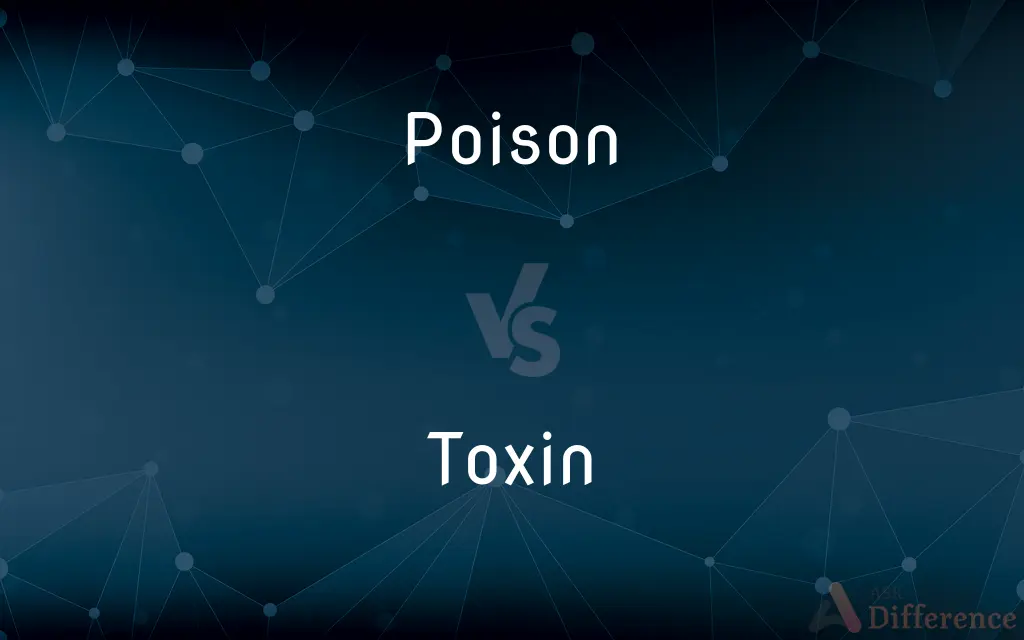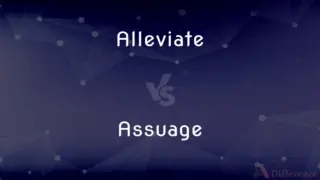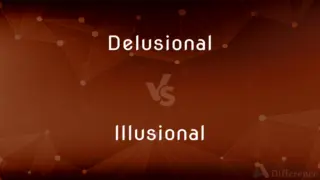Poison vs. Toxin — What's the Difference?

Difference Between Poison and Toxin
ADVERTISEMENT
Compare with Definitions
Poison
In biology, poisons are substances that can cause death, injury or harm to organs, tissues, cells, and DNA usually by chemical reactions or other activity on the molecular scales, when an organism is exposed to a sufficient quantity.In a metaphorical broader use of term it may refer to any thing deemed harmful. The fields of medicine (particularly veterinary) and zoology often distinguish a poison from a toxin, and from a venom.
Toxin
A toxin is a harmful substance produced within living cells or organisms; synthetic toxicants created by artificial processes are thus excluded. The term was first used by organic chemist Ludwig Brieger (1849–1919), derived from the word toxic.Toxins can be small molecules, peptides, or proteins that are capable of causing disease on contact with or absorption by body tissues interacting with biological macromolecules such as enzymes or cellular receptors.
Poison
A substance that causes injury, illness, or death, especially by chemical means.
Toxin
A poison of plant or animal origin, especially one produced by or derived from microorganisms and acting as an antigen in the body.
Poison
Something destructive or fatal.
ADVERTISEMENT
Toxin
A poisonous substance, especially a protein, that is produced by living cells or organisms and is capable of causing disease when introduced into the body tissues but is often also capable of inducing neutralizing antibodies or antitoxins.
Poison
(Chemistry) A substance that inhibits another substance or a reaction
A catalyst poison.
Toxin
A poisonous or harmful nonbiological substance, such as a pollutant.
Poison
To kill or harm with poison.
Toxin
(strictly) A toxic substance, specifically a poison produced by the biological processes of organisms.
Poison
To put poison on or into
Poisoning arrows.
Poisoned the drink.
Toxin
Synonym of toxicant: a toxic substance in a body requiring removal.
Poison
To pollute
Noxious fumes poison the air.
Toxin
A poisonous product formed by an organism, such as a pathogenic bacterium, a plant or an animal, usually having a high molecular weight, often a protein or a polysaccharide, but occasionally a low-molecular weight agent such as tetrodotoxin.
Poison
To have a harmful influence on; corrupt
Jealousy poisoned their friendship.
Toxin
A poisonous substance produced during the metabolism and growth of certain microorganisms and some higher plant and animal species
Poison
Chemistry & Physics To inhibit (a substance or reaction).
Poison
Poisonous.
Poison
A substance that is harmful or lethal to a living organism when ingested.
We used a poison to kill the weeds.
Poison
Something that harms a person or thing.
Gossip is a malicious poison.
Poison
(informal) An intoxicating drink; a liquor. (note: this sense is chiefly encountered in the phrases "name your poison" and "what's your poison ?")
— What's your poison?
— I'll have a glass of whisky.
Poison
(chemistry) Any substance that inhibits catalytic activity.
Poison
(transitive) To use poison to kill or paralyse (somebody).
The assassin poisoned the king.
Poison
(transitive) To pollute; to cause to become poisonous.
That factory is poisoning the river.
Poison
(transitive) To cause to become much worse.
Suspicion will poison their relationship.
He poisoned the mood in the room with his non-stop criticism.
Poison
(transitive) To cause (someone) to hate or to have unfair negative opinions.
She's poisoned him against all his old friends.
Poison
(chemistry) To inhibit the catalytic activity of.
Poison
To place false information into (a cache) as part of an exploit.
Poison
Any agent which, when introduced into the animal organism, is capable of producing a morbid, noxious, or deadly effect upon it; as, morphine is a deadly poison; the poison of pestilential diseases.
Poison
That which taints or destroys moral purity or health; as, the poison of evil example; the poison of sin.
Poison
To put poison upon or into; to infect with poison; as, to poison an arrow; to poison food or drink.
Poison
To injure or kill by poison; to administer poison to.
If you poison us, do we not die ?
Poison
To taint; to corrupt; to vitiate; as, vice poisons happiness; slander poisoned his mind.
Whispering tongues can poison truth.
Poison
To act as, or convey, a poison.
Tooth that poisons if it bite.
Poison
Any substance that causes injury or illness or death of a living organism
Poison
Anything that harms or destroys;
The poison of fascism
Poison
Spoil as if by poison;
Poison someone's mind
Poison the atmosphere in the office
Poison
Kill by its poison;
This mushrooms can kill
Poison
Kill with poison;
She poisoned her husband
Poison
Add poison to;
Her husband poisoned her drink in order to kill her
Poison
Administer poison to;
She poisoned her husband but he did not die
Share Your Discovery

Previous Comparison
Alleviate vs. Assuage
Next Comparison
Delusional vs. Illusional














































